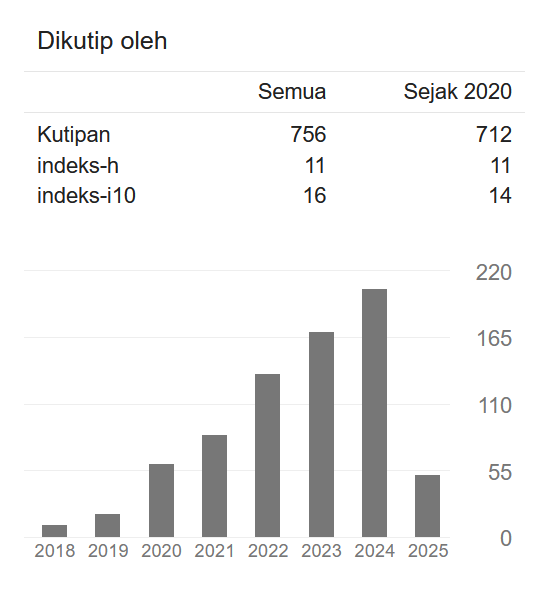The Position of Women and Women's Rights in Islamic Family Reform: A Comparison in Indonesia and Tunisia
DOI:
https://doi.org/10.19109/medinate.v20i1.23218Keywords:
Position, Women, Rights, Reform, ComparisoAbstract
This research was prepared with the aim of discussing the position and fight for women's rights in the Islamic Family reform (Comparison in Indonesia and Tunisia). Some women demand that their rights be taken away by male hegemony. This theme ultimately falls within the scope of the Holy Quran which is used as a source of legitimization of the relationship between men and women. The research method used in this study is the method of collecting data through library research. Data is collected by gathering information from various sources of literature, including books, magazines, journals, and others. From this research, it can be concluded that the reform of Islamic family law in Indonesia and Tunisia was carried out to answer the needs of the times and especially to raise the degree (status) of women, namely through nurturing, preserving and then fighting for women's rights. Although the minimum standards of marriage and polygamy differ in the two countries, they share a similar principle and goal: the protection of women's rights. Nonetheless, these rights are equivalent by nature in sharia (maqasyid ash-shari'ah), such as the right to mental and psychological health (equivalent to the nature of hifz an-nafs/maintaining the soul), then the right to maintain reproductive health (equivalent to the nature of hifdz al-nasl/maintaining offspring), Furthermore, the right to obtain equal opportunities in the field of education (commensurate with the nature of hifdz al-'aql / preserving the intellect) and the provisions of polygamy between the two countries also have commensurate goals and principles, namely to protect women's honor or human rights (commensurate with the principle of hifdz al-'ird).
References
Abdullah, S. (2016). The Dynamics of Qiyas in Islamic Law Reform. Pedoman Ilmu Jaya.
Abubakar, F. (2011). Family Law Reform: Wills for Heirs (Comparative Study of Tunisia, Syria, Egypt and Indonesia). Hunafa: Journal of Studia Islamika, 8(2), 237–267.
Abubakar, Z. A. (1993). Collection of laws and regulations in the religious court environment. (No Title).
Ali, M. D. (1994). Marriage Regulations in Indonesia and the Position of Women Therein. Mimbar Hukum: Actualization of Islamic Law 15, 29–30.
Anderson, J. N. D., & di Dunia Modern, H. I. (1990). translated by Machnun Hussein. Surabaya: Amarpress.
Baidowi, A. (2023). Feminist Tafsir: Women's Studies in the Quran and Contemporary Mufasirs. Nuansa Cendekia.
Bancin, R. L. (2018). Islamic Family Law in Tunisia. Journal of Research in the Field of Religion.
Darmawijaya, E. (2015). Polygamy in Islamic and Positive Law (A Review of Turkish, Tunisian and Indonesian Family Law). Gender Equality: International Journal of Child and Gender Studies, 1(1), 27–38.
Elinor, L. B. B. and. (2019). Feminism, The Beliefe in Social, Economic, and Political Equality of the Sexes. Encyclopedia Brittanica.
Engineer, A. A., Wajidi, F., & Assegaf, C. F. (2000). Women's rights in Islam. Institute for the Study and Development of Women and Children.
Gamble, S. (2004). The Routledge companion to feminism and postfeminism. Routledge.
Hasyim, S., Abdalla, U. A., & Rahmat, I. (1999). Women's Movement in Islam in Contemporary Historical Perspective.. Tashwirul Afkar, 5(1), 2–11.
Hefni, A. (2018). Educating the Children of the Messenger of Allah. QultumMedia.
Khasanah, F. (2018). Comparative Analysis of Laws on Polygamy in Muslim Countries; Saudi Arabia, Indonesia and Tunisia. UIN SUNAN KALIJAGA YOGYAKARTA.
Komarudin, K. (2019). Family Law in Tunisia and Indonesia. Kordinat: Journal of Communication between Islamic Universities, 18(1), 194–225.
Mardani. (2011). Islamic marriage law in the modern Islamic world. Graha Ilmu.
Mernissi, F. (1997). Queens of Islam: the forgotten ones. Mizan Publisher.
Mudzhar, M. A., & Alwustho, M. (1998). Reading the Waves of Ijtihad: Between Tradition and Liberation. (No Title).
Muhammad, A. (2016). Islamic Law and Religious Courts
Muin, F. M. F. (2022). Islamic Family Law Reform in Indonesia in Improving the Status of Women. Legal Studies Journal, 2(1).
Nasution, K. (2012). Marriage and Inheritance Law in the Modern Muslim World. Yogyakarta: ACAdeMIA.
Rachmatulloh, M. A. (2020). Study of Islamic family law in Tunisia. Al-Syakhsiyyah: Journal of Law & Family Studies, 2(2), 307–326.
Rahmat, A. (2014). The Complexity of Islamic Family Law in the Republic of Tunisia. Al Muqaranah, 1, 29–54.
Roded, R. (1995). The Flower of Civilization: The Image of Women in the Eyes of Muslim Biographers. Mizan Publisher.
Rusydi, I. (2017). H Grant and its relationship with inheritance according to the Compilation of Islamic Law and Civil Law. Galuh Justisi Scientific Journal, 4(2), 212–224.
Subhan, Z. (2015). The Qur'an and women. Prenada Media.
Suma, M. A. (2004). Islamic family law in the Islamic world. RajaGrafindo Persada.
Ummah, D. C. (2014). Criminalization of Polygamy in Family Law in the Islamic World (a comparative study of the Indonesian-Tunisian Family Law Act). Faculty of Sharia and Law UIN Syarif Hidayatullah Jakarta.
Wagianto, R., & Affan, M. S. (2022). Reviewing Women's Rights in Islamic Family Law Reform in Indonesia and Tunisia. Asy-Syari'ah: Journal of Islamic Law, 8(2), 81–102.
Wahyuni, S. (2011). Islamic Family Law Reform in Muslim Countries. Cosmic Law,. Kosmik Hukum, 11(1).








